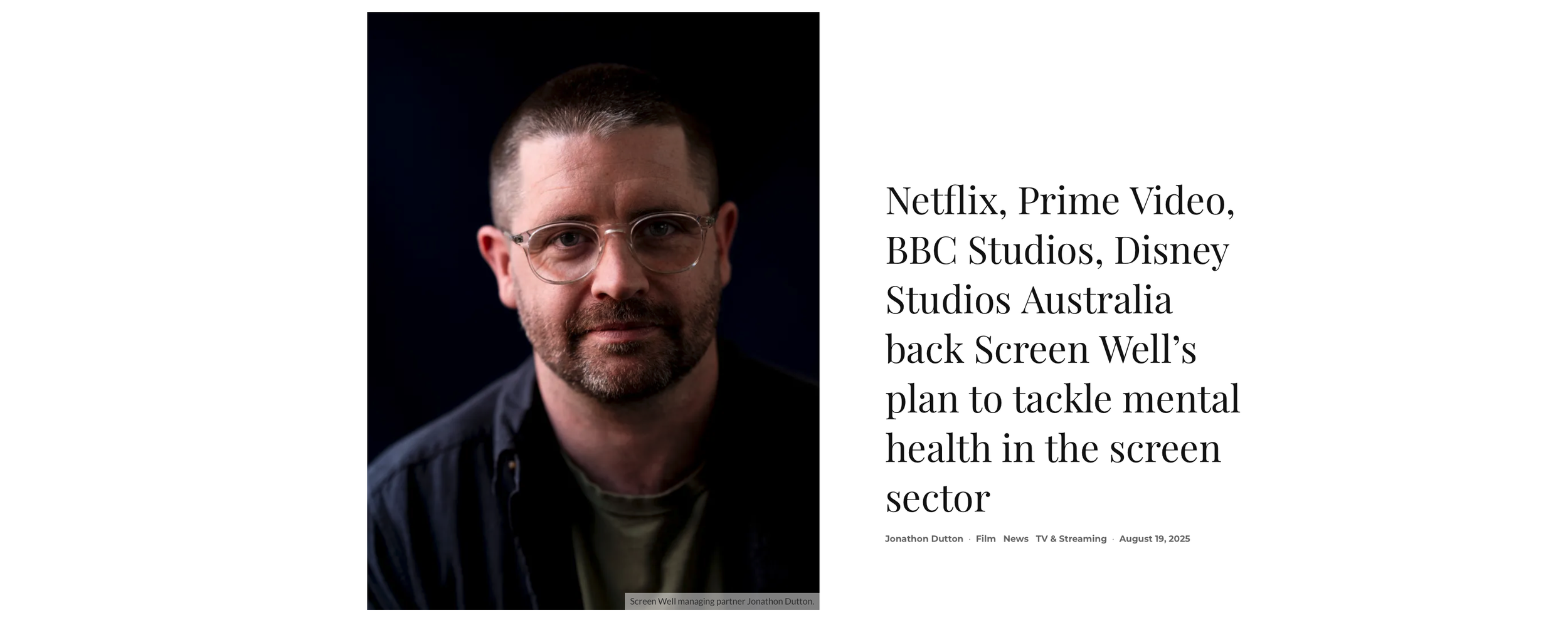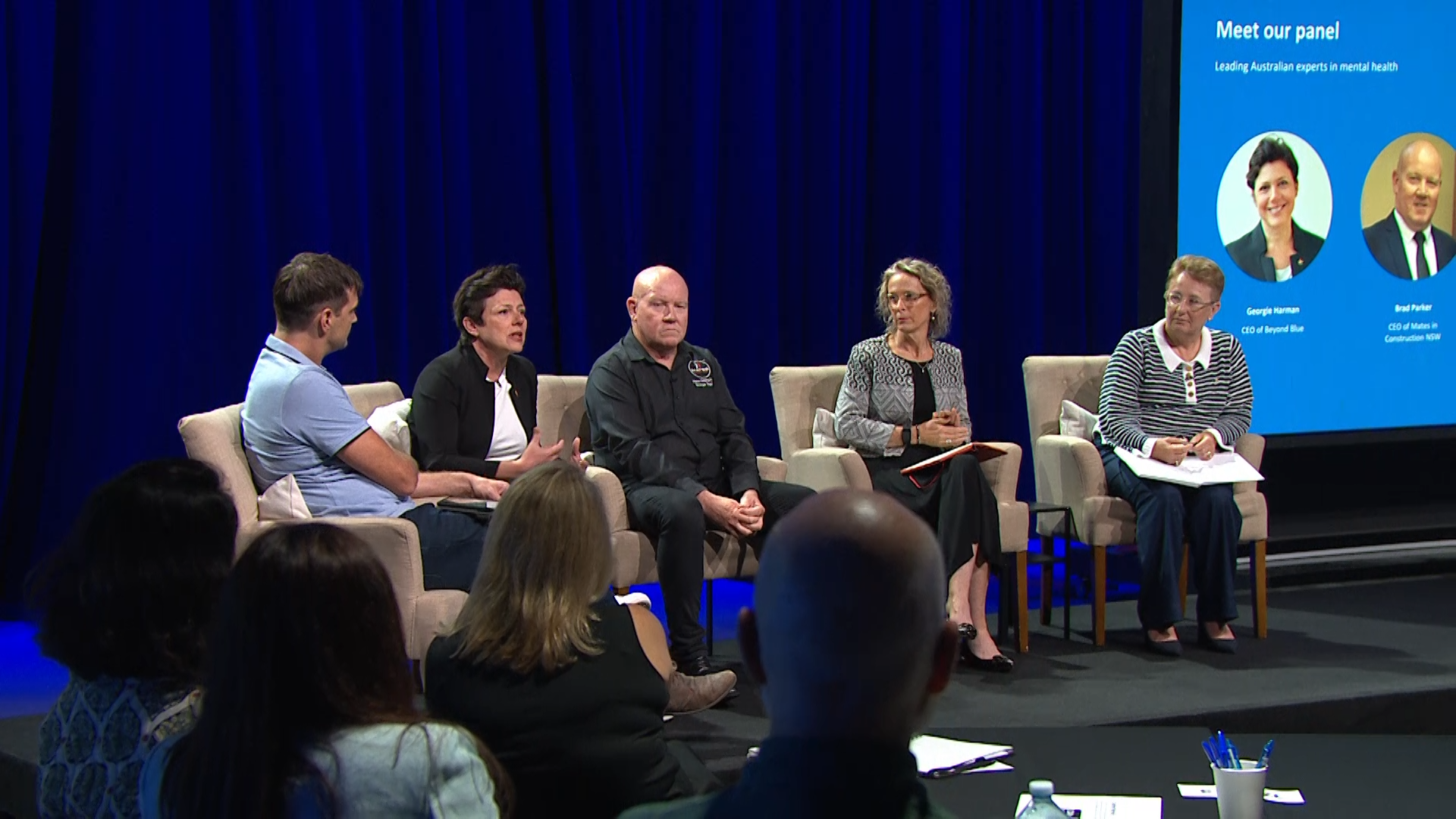
Screen Well, with support from Netflix, Prime Video, BBC Studios and Disney Studios Australia, is co-designing a Mental Health Action Plan for the screen sector. Managing partner Jonathon Dutton reflects on the momentum to create lasting change.
In the 80s, it took a specific tragedy – the death of focus puller David Brosttoff during the filming of 'Midnite Spares' in 1982 – to improve physical safety. Safety Supervisors are now the norm – they’re expected, and it’s a similar story for Intimacy Coordinators after #MeToo. It is our hope that when we look back in 5 - 10 years, a comprehensive mental survey from Griffith University, the Pressure Point Report, will be the moment that inspires new norms for psychological wellbeing at work.
These research findings were presented at the Mental Health Matters Summit in January this year, hosted by Screen Well and the ABC, with the goal of putting mental health back on the industry agenda to better support the people who bring our screen stories to life.
The good news is the Summit concluded with over 70 industry leaders from independent production companies, national and state screen agencies, guilds, networks, and streamers, all standing to show their commitment to improving the mental health outcomes of our industry. And I have to say, it was an inspiring moment to be part of.
Fast forward six months and Screen Well has secured the support of major funders Netflix and Prime Video, along with contributions from BBC Studios and Disney Studios Australia, to co-design a Mental Health Action Plan with the sector - a new initiative to improve psychological wellbeing across screen workplaces to be launched later in the year. The plan will outline short-term recommendations aimed at creating immediate impact, while setting out a longer-term vision for the industry—one that encourages meaningful action to address deeper systemic and structural challenges related to mental health.
The Mental Health Matters Screen Summit in January. (L-R): Screen Well founder and managing partner Ben Steel, Beyond Blue CEO Georgie Harman, Mates in Construction NSW CEO Brad Parker, Workplace Mental Health Advisory Director Margo Lydon and The Corporate Mental Health Alliance Australia board member Lucinda Brogden.
Why mental health deserves our attention
With 864 complete responses, the Pressure Point report found that:
72 per cent disagreed that the Australian screen industry is a mentally healthy place to work
75 per cent needed mental health support specifically because of their work in the industry
72 per cent disagreed that the psychological wellbeing of workers is a priority for their organisation
Could these findings have something to do with the 36 per cent who said they’ve considered quitting in the last six months? Or the 25 per cent who said they’re likely to leave in the next six months? While I understand there are many factors at play here, such as job insecurity, when it comes to mental health and industry sustainability, these findings should demand our attention.
This situation echoes a pivotal moment in the UK. In 2018, the UK Film and TV Charity released its comprehensive Looking Glass Survey, which, like Australia’s Pressure Point Report, confirmed what many of us suspected: screen industry mental health is considerably worse than that of the general population. Consequently, the report marked a massive step change in the UK, inspiring major changes and reforms, largely driven by the Charity. And so, we hope our 2025 is their 2018 - and I think it might just happen.
In the words of Beyond Blue CEO Georgie Harman AM who spoke on the Summit expert panel:
“I’m really excited for you as an industry. You’ve just seen some really hard facts that you can’t look away from now. You’ve got big challenges ahead, but for every single industry who has come to us in strife, there are solutions. And they come from within the industry, so you’re taking the first step together.”
Co-designing solutions
Following the expert panel at the smmit that explored how other industries are tackling workplace mental health, as well as a pre-recorded address from UK Film and TV Charity CEO Marcus Ryder, leaders were invited to take part in a workshop to be part of the solution.
Building on the ideas and insights that came out of that workshop, Screen Well just ran a series of six roundtables with expert guidance from Margo Lydon from Workplace Mental Health Advisory. These roundtables facilitated deep dives into key issues and opportunities, with representatives taking part from the ABC, Netflix, BBC Studios, Creative Workplaces, Screen Producers Australia, Matchbox Pictures, Australian Cinematographers Society, Wildbear Entertainment, Network 10, Princess Pictures, Crew HQ, SaCSA, AFTRS, Warner Brothers Discovery, Dreamchaser, Ausfilm and the UK Film and TV Charity.
The roundtables were designed specifically with our shared workforce in mind, because we all know how tough a production can be in terms of the long hours and working conditions – so taking responsibility for their mental health needs to be a collective effort. Let’s not forget, one quarter of survey respondents said they are likely to leave the industry in the next six months…
To inform the roundtables and avoid reinventing the wheel, we brought ideas and suggestions from overseas and other industries to the table to explore and interrogate.
Griffith University’s Bobbi-Lea Dionysius and Peter Hegedus present the Pressure Point report findings at the Mental Health Matters Summit.
The focus of the roundtables
The first roundtable looked at what preventative actions we can take to reduce the risk of harm. This was inspired by the work of the UK Film and TV Charity’s Whole Picture Toolkit and recent changes to Work Health and Safety (WHS) legislation here in Australia. This roundtable identified psychosocial risk assessments as a necessary and important first step for all productions (just like we do for physical safety).
The second roundtable looked at how we can increase workplace support, based on the level of risk identified. This was inspired by the peer-led support model that ‘Mates (in construction)’ created, which is considered world’s best practice in sector-based suicide prevention by the World Health Organisation. We also looked at the role wellbeing facilitators could play, and how we might better utilise existing supports, such as the Support Act helpline.
The third roundtable looked at what training and development is needed to improve mental health outcomes. Specifically, training to enhance compliance, such as psychosocial risk management and responding to bullying and harassment, as well as training to enhance critical ‘soft skills’ for leaders and managers, such as conflict resolution and emotional regulation during stressful times.
Roundtable four dived into how we can address bullying, harassment and discrimination and support those impacted at both a production level and at an industry level, which the Pressure Point Report found to be an ongoing problem (48 per cent experienced bullying in the past year and 35 per cent experienced harassment/discrimination). This roundtable also looked at workplace insight and survey tools to give people a voice and to shine light on blind spots; as well as how we can encourage productions across the country to adopt our recommendations.
The final two roundtables explored how an organisation (such as Screen Well) can best support the industry, and how we can fund the development of the resources, tools and training needed to help all productions, particularly smaller productions, to adopt our recommendations, which will come in the form of the Mental Health Action Plan.
The path forward
The Mental Health Action Plan, supported by major funders Netflix and Prime Video, with contributions from BBC Studios and Disney Studios Australia, will outline short-term recommendations to improve psychological wellbeing at work, as well as a longer-term vision for the industry, encouraging further action to address deeper, systemic, and structural issues.
From here, we will be consulting with the wider industry and experts to get feedback, to ensure our recommendations are achievable and will make a difference. We will then return for a second round of roundtables to get the buy-in and support of leaders across our industry, so we can start working together to shift the stats presented in the Pressure Point Report. To this end, we intend to pursue an Australian Research Council Linkage Grant in partnership with Griffith University to rigorously evaluate and continuously improve all mental health interventions across the sector.
Ultimately, this is about safeguarding the people who bring our stories to life, who we know are experiencing high levels of mental distress, which impacts the sustainability of our industry and the quality of the work we produce. It’s time for change and with so many partners and organisations willing to go on this journey with us – we’re quietly optimistic it’s going to happen. Stay tuned.
To learn more about the roundtables, the development of the Mental Health Action Plan, or to reach out if you would like to contribute, visit www.screenwell.com.au



